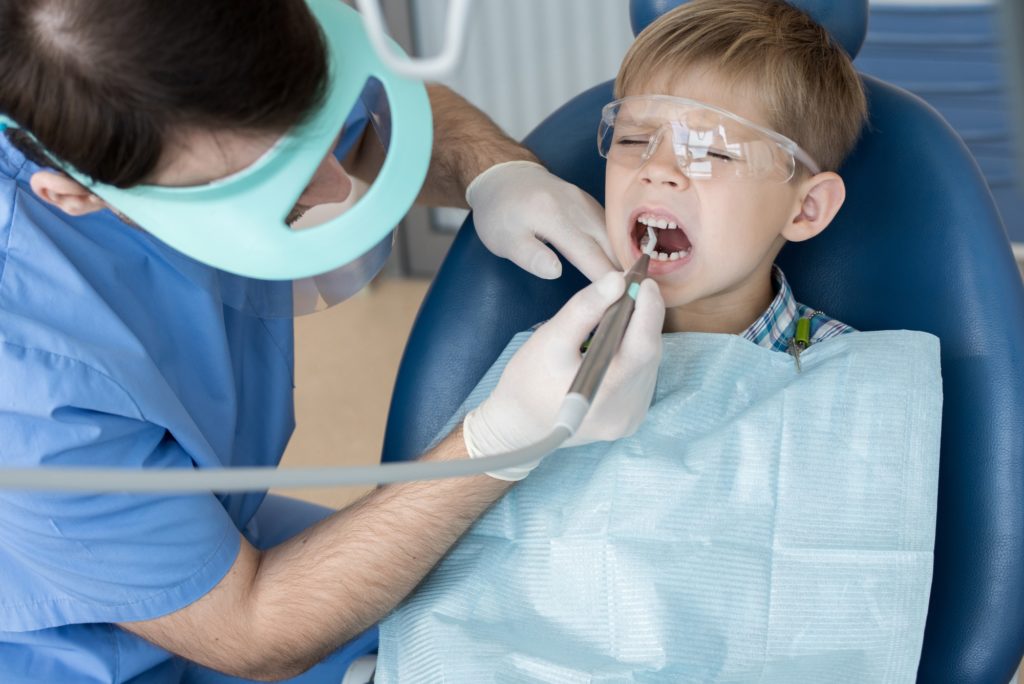My Child is Afraid of the Dentist... What Do I Do?

Rest assured, it’s completely normal for your child to be nervous or scared about going to the dentist for the first time, or even the first few times! Just like any other new experience, your child probably has a lot of questions about what they’re about to go through! Even some adults are anxious about visiting the dentist’s office… Here are some ideas to help ease your child’s mind about going to the dentist.
Table of Contents
Why You Should Start Visiting the Dentist Early with Your Child?
The American Academy of Pediatric Dentistry recommends that your children go for their first checkup at the dentist when their first tooth comes in, or no later than their first birthday. Your child’s first dental visit will be quick and pretty easy! You’ll get some feedback on habits like thumb sucking and pacifiers, and your child’s dentist will make sure his or her new teeth are healthy and growing in the right way! Your child’s first visit will help him or her to get used to visiting the dentist’s office and become comfortable with the experience. Over time, the team will ease your child into a regular visit routine, so they’ll know what to expect. The earlier you start the process of bringing your child to the dentist’s office, the better.
6 Things You Can Do to Help Your Child Become Comfortable With The Dentist
1. Read Children's Books About Going to the Dentist
Here is a great list of books to read before your child’s first dental visit! You know what your child will respond to, so pick from this list to help you share some positive stories about the dentist.
- Mercery Myer – Just Going to the Dentist
- Anne Civardi – Going to the Dentist (see below for a video read-aloud!)
- Marc Brown – Arthur’s Tooth
- PK Hallinan – My Dentist, My Friend
- Robert Munsch – Andrew’s Loose Tooth
- Paulette Bougeois – Franklin and the Tooth Fairy
- Mary W. Olson – Nice Try, Tooth Fairy
- Sleby B. Beeler – Throw Your Teeth on the Roof: Traditions from Around the World
- Hope Martin – What Does the Tooth Fairy Do with All Those Teeth?
- William Steig – Doctor De Soto
- Stan Berenstain – The Berenstain Bears Visit the Dentist
Casey Newmann – Chase’s Loose Tooth!
2. Play A Game of Pretend "Going to the Dentist"
Your child loves to play pretend. Get out their toothbrush and pretend to be the dentist with your child. You can simply act out the visit in a fun way, by having them sit in a special chair, counting their teeth, and brushing and flossing. And, let them play dentist too! A stuffed animal (or you) can play their patient. Your quick game of pretend can help to make their dentist visit seem fun and inviting.
3. Talk to Your Kids About Going to the Dentist
Your child loves to play pretend. Get out their toothbrush and pretend to be the dentist with your child. You can simply act out the visit in a fun way, by having them sit in a special chair, counting their teeth, and brushing and flossing. And, let them play dentist too! A stuffed animal (or you) can play their patient. Your quick game of pretend can help to make their dentist visit seem fun and inviting.
4. Tell Your Kids About Dentist Visits in Advance, but Not Too Far in Advance!
A few days before going to the dentist for the first time or any time in the future, tell your child about it. They won’t need much detail, but it may be helpful to tell your child about the visit and help them understand what to expect. Use age-appropriate words they can understand, and keep things positive and to the point! We don’t recommend telling your child about a dental visit too far in advance, because that can cause anxiety in some children.
5. No Surprise Visits or Procedures
If your child needs to have a procedure like a filling, don’t surprise them because that can create anxiety and mistrust (in both you and your child’s dentist). It can be helpful to ask your dentist for tips on how to explain the procedure, or you can ask to have the dentist speak with your child if that feels more comfortable. After all, your child’s dentist is trained to talk about dentistry in a kid-friendly, easy-to-understand way!
6. Work on Your Fear of the Dentist If You Have One
Research shows that parents can certainly pass on their dental fears to their kids. If you’re apprehensive about visiting your dentist, try not to let it show when you’re talking to your kids at home. It can be helpful to both you and your children to talk about the dentist in an upbeat way. Try to be relaxed and happy when you go into the dentist’s office with your child.
Dental Anxiety in Children FAQs
To help kids overcome their fear of the dentist:
- Start by introducing them to the dental office positively, letting them meet the dentist and staff before their first appointment.
- Use age-appropriate books or videos to explain what to expect during a dental visit, emphasizing the importance of dental hygiene.
- Avoid using negative language or sharing your dental anxieties.
- During the visit, choose a pediatric dentist experienced in working with children and consider using distraction techniques like playing their favorite music or bringing a comfort item.
Praising and rewarding them after the visit can also create positive associations with dental care. Regular dental check-ups from an early age can desensitize kids to the experience and reduce fear over time.
Children are susceptible to dental anxiety for several reasons. First, they may fear the unknown, as dental visits often involve unfamiliar sights and sensations. Additionally, children have sensitive mouths, making some dental procedures uncomfortable or even painful. Dental anxiety can also be influenced by a child’s previous negative experiences or hearing about others’ dental horror stories.
The white coats, masks, and instruments in a dental office can seem intimidating to young children. Effective communication, a child-friendly environment, and gentle, compassionate care are crucial in alleviating these anxieties and ensuring positive dental experiences.
Signs of dental anxiety in children may include extreme reluctance or refusal to visit the dentist, crying or becoming visibly upset before or during dental appointments, physical symptoms like a racing heart or upset stomach, complaints of tooth pain or dental issues even when none exist, and excessive fear or avoidance of dental-related topics or objects like toothbrushes.
Some children may also exhibit behavioral changes, such as becoming more withdrawn or irritable when dental visits are mentioned. Parents and caregivers need to recognize these signs and address dental anxiety to ensure their child’s oral health and overall well-being.
